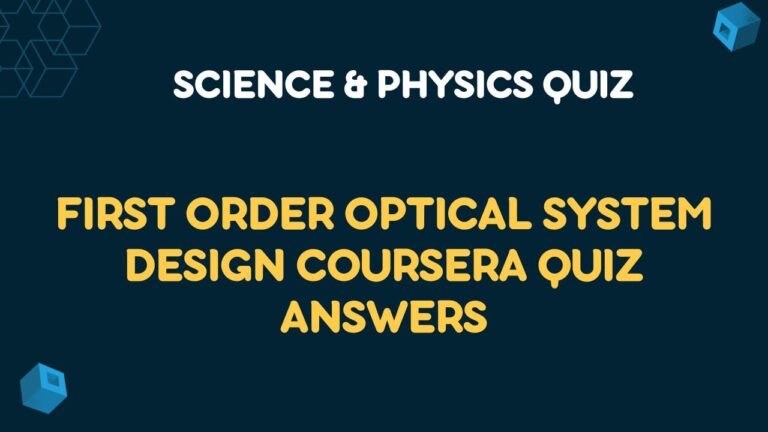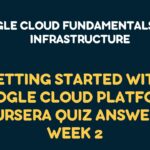Get All Weeks Energy: The Enterprise Coursera Quiz Answers
Table of Contents
Energy Touches Everything Quiz Answers
Q1. Video: World’s Most Asked Questions: What Is Energy?
Please watch the video to answer questions 1-3.
Energy is the ability to
- Do everything
- All of the above
- Do work
- Use your motions
Q2. Which of the following was not an example of work in the video?
- Stomp Rocket
- Track Race
- Patty Melt
- Phone and Computer
Q3. What type of energy does the log contain in the video?
- Nuclear energy
- Mechanical energy
- Kinetic energy
- Chemical energy
Q4. The sun heats the earth with ______ light.
- Infrared
Q5. What greenhouse gas has over 100x the efficiency of carbon dioxide to reflect light back to the earth?
- Methane
- None of the above
- Nitrous oxide
- Water vapor
Q6. What is the average life span a methane molecule spends in the atmosphere?
- 8 years
- 100 years
- 1 year
- 12 years
Q7. Which of the following is not a source of renewable energy used for U.S. electricity generation?
- Solar
- Biomass
- None of the above
- Hydro
- Geothermal
Q8. 100% of nuclear electric power is used in the residential and commercial sector. (T/F)
- True
- False
Q9. What source of energy makes up the largest percentage of electricity generation today and why?
- Renewables, since it is the safest and newest source of electricity generation.
- Nuclear, since it offers a big amount of energy while maintaining a low-carbon energy infrastructure.
- Natural Gas, since it gives off a lot of energy and can be transported through pipes.
- Coal, because it can still be used in remote locations where there isn’t much electricity.
Q10. Potential energy is the energy that something possesses due to its motion. (T/F)
- True
- False
Energy Sources Quiz Answers
Q1. Video: Solar Energy
Please watch the videos and answer questions 1-3.
According to the video, What the term used to describe the most efficient photovoltaic technology?
- Concentrated Solar
- Photovoltaic cells
- Solar Panels
- Concentrated Photovoltaics
Q2. According to the video, A traditional solar panel consists of N-Type silicon and P-Type silicon with a conductor connecting both. (T/F)
- True
- False
Q3. According to the video, what is the benefit of using solar cell technology?
- Ability to use a distributed generation approach.
- Solar panels are very cheap and can save money.
- Never have to pay a utility provider for electricity
- All of the above
Q4. Natural gas comes from
- Conventional non-associated gas pockets
- All of the above
- Gas-rich shale
- Conventional associated gas pockets
Q5. Where is the Barnett and Marcellus shale located?
- Pennsylvania; South Carolina
- Alaska; Virginia
- Georgia; Texas
- Texas; New York
Q6. Liquefied Natural Gas ships transport compressed natural gas but are not welcomed on the coastline because they are considered security hazards. (T/F)
- True
- False
Q7. Which of the following is a type of Solar Photovoltaic cell?
- Organic photovoltaic cells
- Amorphous silicon
- Crystalline Silicon
- None of the above.
Q8. People put ___ covers on their pool to increase the temperature of the water in it.
- solar pool cover
Q9. Which color did the former secretary of energy, Steven Chu, advocate painting the top of buildings to reflect sunlight out of cities?
- Black
- Blue
- White
- Yellow
Q10. Why is the typical solar cell less than 20% efficient?
- People don’t have the funds to get a solar panel that’s 90-95% efficient
- Solar technology was just discovered recently and still needs work
- All of the above
- The cells can only receive certain wavelengths of light at times.
Energy & Utility Solutions Quiz Answers
Q1. Please watch the following video and answer questions 1-6.
A Smart grid provides _______________
- a one-way communication path
- addresses only small energy demands
- localized power generation built around communities
- electricity measurements at the source
Q2. Associated terms regarding Smart Grid often include:
- computers
- technology
- automation
- two-way communication
- controls
Q3. ___________ (HAN) connects smart appliances within a home to energy efficient system
- Home Access Network
- Home Affective Network
- Home Area Network
- Home Area Number
Q4. Electricity generated must equal ___________ across the grid
- reduction
- consumption
- regulation
- distribution
Q5. Secondary power sources are always required in power outages.
- True
- False
Q6. A disadvantage of Smart Grid is:
- it’s less efficient
- consumers will get fewer energy bills
- it’s less secure
- it’s more reliable
Q7. Building efficiencies can impact
- distribution
- supply
- none
- demand
Q8. The common themes between the lectures and this video, Embodied Energy Explained, are:
- We buy energy when we buy raw materials
- The sum of all the energy that goes into raw materials to put an item in your hand is called embodied energy
- Transporting an item from a retail store to your home involves energy consumption
- Energy is involved at every stage of the supply chain
- Embodied energy does not equal embedded energy
Q9. How can we reduce infrastructure investment costs while assuring that power will always be available in an area?
- Both
- Utilize battery storage coupled with a renewable energy source to decentralize the transmission system.
- Build a power plant in the area of interest
- Neither
Q10. The following generation sources are moving from a more centralized to a decentralized distribution system: wind, solar, nuclear, and fuel cells. Advantages (s) of this include:
- long-distance transmission
- resiliency
- less loss of energy
- diversity of supply
Get All Course Quiz Answers of Energy Production, Distribution & Safety Specialization
Electric Power Systems Coursera Quiz Answers
Natural Gas Coursera Quiz Answers
Safety in the Utility Industry Coursera Quiz Answers
Energy: The Enterprise Coursera Quiz Answers

